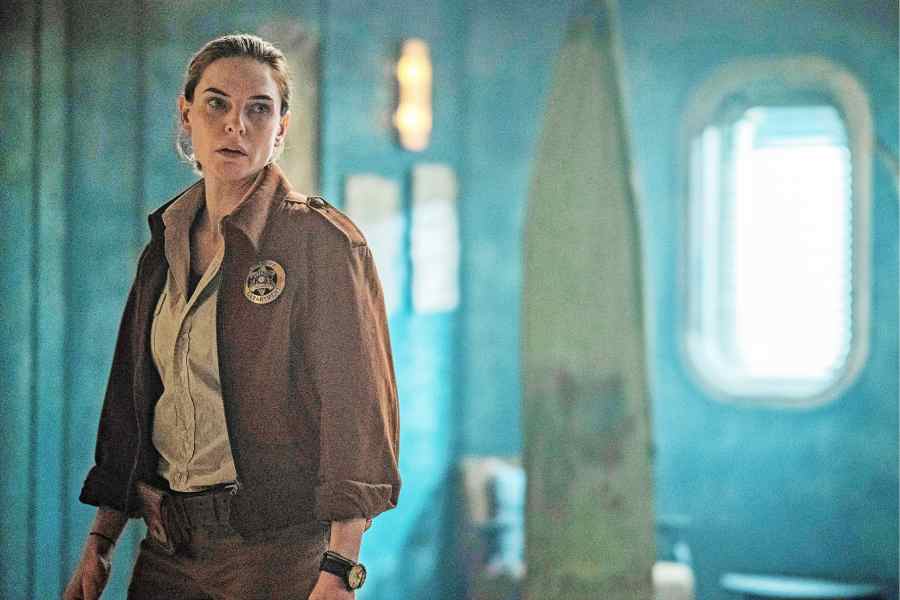The premise has been heard before. It’s a post-apocalyptic world where a handful of humans exist, confined in a container where law and order are paramount. Only a glimpse of the world outside can be seen and something’s not right. But Apple TV+’s Silo, an adaptation of Hugh Howey’s wildly popular Wool novels, is much more. The characters are torn with ideas and moral questions. They live in a self-sustaining Silo. The people here have no memory of the world before the Silo, so they are afraid of breaking out.
Spearheaded by Graham Yost, the subterranean universe here is packed with emergencies from the very first episode. Silo needs a heroic character and that person is Juliette Nichols, played by Rebecca Ferguson of Mission: Impossible and Dune fame. The daughter of a doctor, she chose to work in Silo’s extreme netherworld, ensuring an ancient generator keeps on running to provide the 144-tiered structure its power. What does it mean to be in a Silo? Here’s what the 39-year-old actress has to say.
Your character Juliette is a strong, independent character, who is always willing to take the situation into her hands and move with the action. Would that be a fair description?
What makes her interesting is all of the aspects that you described about her, they are all there on paper, they’re so well written. And for me, what I liked is finding where the cracks and the flaws lie because that is also what makes us strong and that is how we grow from them. What’s so wonderful about Julia is this phenomenal mechanic, who runs the machinery that runs the Silo… very necessary and she’s very good at it. She doesn’t like being touched; she doesn’t like having too many people around her. She is an introvert because of all the trauma that she’s had in her life. And the lovely journey of her, taking her out of her comfort zone and throwing her into a very difficult environment, where she doesn’t have a tool, where she is forced to meet people and herself, and yet still manage, therein resides her strength.
How did you get into the character? Did you find inspiration in a character from a book or maybe the screen?
I do a lot of research on blog pages of fans. So I follow them and I can go down a rabbit hole; I can do it for hours and hours. I usually find someone who speaks very well about what they like about certain characters. And it’s usually sci-fi post-apocalyptic kind of world because there’s such a big fan base to these huge books. People are so devoted to having the conversation about what they love and what they don’t like. And that’s basically what I do. I do all that research and I bring it to the character
After watching Silo, one may get a feel as to what claustrophobia can be like as well as be curious.
It’s a good one. I want to sell the fact that it is claustrophobic. But what’s more interesting is the fact that you and I watching it become claustrophobic because we have the option of being outside. That is our reality. It’s not their reality; their reality is living in it for 200 years. So claustrophobia isn’t an emotion really, it’s a natural sense and a state. But that’s what makes it fun watching it and thinking. And these people are moving in it; it’s their own, and they have their own system and their own structure. And then you have people who ask questions. Now the pressure’s on… now the claustrophobia starts really (getting to people) because you realise that people want (to move in) another direction. What happens when you have too many people locked in a closed environment who don’t want to follow laws and a big book?
You are also an executive producer on the show. Does that bring a different kind of responsibility?
It felt more of an opportunity to sit in with people who are so good at their job. Graham Yost is such a good writer, he’s such a good showrunner, but also, he runs a really good set. So even though he comes in and then he goes back to America (the show has been shot in England), because he does too many shows to be able to be everywhere, like Hermione’s Time-Turner in Harry Potter, but I would listen to him, I would see the changes that would happen, the ripple effects of who he was and who he hired. And then being an executive producer, yes, I would have a voice in the room. I would use my voice, they would listen to it when it comes to the script alterations or ideas or cast. Basically, the cast was them; I didn’t do much. I was just happy when I saw the cast list, head of departments, and so on. The collaboration was so wonderful.
In the past three years, we have been in a different kind of world and for the most part, we couldn’t go outside. What do you want viewers to take away from the show when it comes to enjoying their independence?
Either the relation to Covid, which was very accidental and quite sad, to be honest, is quite good for a repetitive and ongoing conversation about feeling enclosed in a controlled society. But there’s also that feeling that you kind of don’t want that feeling after something like Covid. So I hope people don’t get locked in a feeling of heaviness. I also want to really underline the fact that it is a murder mystery. It’s exciting, it’s fun, it’s character-driven. It has twists and plots. It’s not just a sort of social, geopolitical, hardcore, controlling storytelling. It’s a journey. It’s also quite light in that sense.











